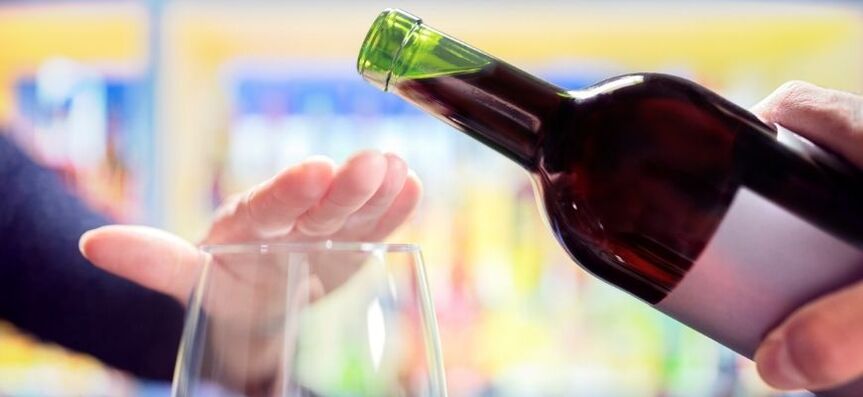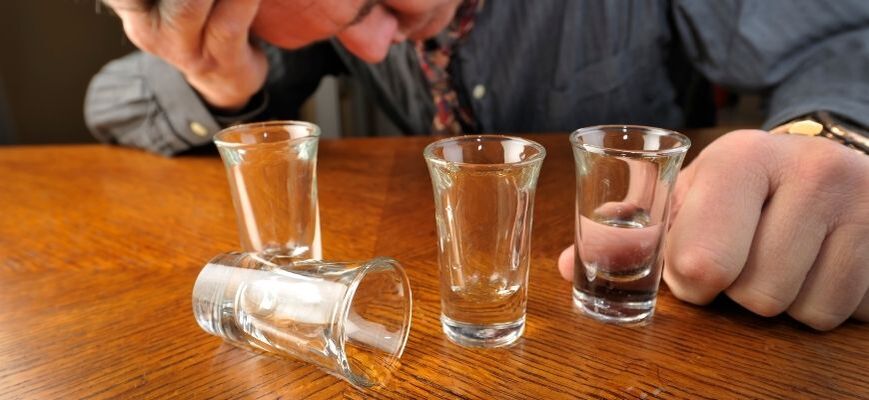Treatment of any form of alcoholism involves the complete refusal of the patient from alcohol. The success of the therapy is reduced to zero if the patient does not want a person to live in a state of sobriety. Conversely, a person's awareness of their disease is already the first step towards remission. This awareness is the result of a very complex work on oneself and requires a lot of time and effort. Therefore, in order to stop drinking, it is better for a person to consult a doctor.

Reasons to stop drinking alcohol
There are many reasons why a person stops drinking. Among the most significant are:
- the desire to be healthy;
- deterioration of the state of health and development of chronic diseases;
- more attractive appearance in people who do not have problems with alcohol;
- a sober, sharp and immaculate mind, the desire to adequately perceive the surrounding reality;
- high efficiency;
- good work attitude and impeccable reputation;
- save money (financial spending on alcohol always takes a significant share in the budget of an alcoholic person);
- high sexuality, no problems with potency in men or the menstrual cycle in women;
- the presence of strength and time (after all, the life of a person who is in an alcoholic network is guided by a desire - to drink);
- excellent state of mind, cheerfulness;
- healthy atmosphere at home;
- full, bright and healthy life;
- healthy offspring.
The path to a sober life is very long and difficult. However, a person has a chance to get rid of the addiction by following the advice of doctors. The most important thing for this is to have a strong desire to be healed and an iron will.

Can a person stop drinking on their own?
Doctors warn: there are no former alcoholics. Alcoholism is an incurable disease. However, the patient always has the option to achieve stable remission and stop drinking alcohol. The length of the sobriety period is variable and can range from several months to several decades.
Patient mind-affecting methods are effective in stopping alcohol consumption. They allow you to inspire the patient with a negative attitude towards alcohol and thus prevent relapses. Barring a positive outcome, a strong belief is formed that you can lead a healthy and fulfilling life without drinking a single drop of alcoholic beverages.
The success of alcoholism treatment depends on a large number of factors. The most significant is that the person himself decides whether to drink alcohol or not.
Spontaneous remission
It rarely happens that a person stops drinking spontaneously. A certain factor pushes for this: there is the acceptance of one's illness, and then the decision that something needs to be changed in one's life.
The main disadvantage of spontaneous remission is indeterminate persistence and spontaneity.
Motivational remission
In this case, a person knowingly refuses to drink alcohol. More often this happens if there is a threat to a person's life. By knowingly refusing alcohol, a person also raises a number of financial problems and also solves the problem of preserving the family.
Gradually, a person comes to the conclusion that a complete refusal of alcohol will allow him to achieve his goals in life and consolidate success. In remission, he is fully convinced that his choice of him is the right and priority one, despite the presence of temptations. Furthermore, every victory over alcohol and the approval of the people around him further strengthens a sober stance.
Forced remission
A person does not always voluntarily seek a sober lifestyle. Many people who are addicted to alcohol don't always understand how harmful their bad habit is. However, circumstances take over. For example, if the director is at work or the spouse, the child puts a person before a choice, he must obey. If not, it will appear for the life of an alcoholic.
Forced remission is usually not lasting. In addition, a person is constantly in a state of tension, because he experiences difficulties and inconveniences from such coercion. A breakdown after such a remission usually has very serious consequences.
Somatogenic remission
If a person becomes aware of a sharp deterioration in health, he usually stops drinking alcohol. The most common situation is when a patient needs to give up alcohol against the background of delirium tremens.
In addition, alcoholics are afraid of the consequences of a serious illness experienced (for example, a heart attack or stroke). Against the background of negative emotions, they completely lose their attraction to alcohol. Awareness of the harm of alcohol, even if belated, forms a new attitude: survival is a higher priority than alcohol consumption and short-term intoxication.
Psychogenic remission
This variant of alcohol withdrawal is associated with somatogenic remission. When a person finds out what he did while intoxicated, he suffers a huge shock. In a state of shame at his actions, he decides to stop drinking.
There can be many of these reasons. Most often it is:
- traffic accidents due to drunkenness;
- an attempt on the life of their children;
- violence.
This remission is unstable and short-lived. Sometimes a strong trigger works in the opposite direction and the person starts drinking even more. In a state of alcoholic oblivion, suicide is not excluded.
Post-intoxication remission
The nature of this remission could not be fully established. It is typical for people who chronically abuse alcoholic beverages. One day they stop drinking and don't discuss this decision.
Doctors suggest that at some point poisoning with ethyl alcohol and its decomposition products reaches a critical limit. At this time, the biochemical processes in the brain change and an aversion to alcoholic beverages appears. It is noteworthy that the taste, smell of alcohol suddenly becomes unpleasant. Even small doses cause nausea and vomiting.
Post-intoxication remission is relatively stable. However, relapses are not excluded when, against the background of a sober lifestyle, a person's state of health improves noticeably.

Tips for people who want to quit drinking
Not all people who have previously abused alcoholic beverages can easily resist a state of sobriety. Some have a painful craving for alcohol, a desire to immediately skip a "glass or two". For those who have taken a sober path firmly and confidently, such advice can help.
- You should contact a specialized clinic. Here, specialists will select an individual treatment plan, prescribe effective drugs if necessary. Psychologists and rehabilitation specialists will help you get out of the binge, cleanse your body, and develop a persistent negative attitude towards the use of ethanol.
- If you want to quit drinking, that's half the battle. The patient must recognize the presence of the disease. If possible, the problem with alcohol should be discussed with loved ones.
- The patient should break all ties with people with whom he drank and who tolerated her addiction.
- Throw out all alcoholic beverages at home. This will make it much easier to avoid temptation. If there is a calm reaction to people who drink alcohol, this is already a success.
- You need to be prepared for the fact that withdrawal symptoms will develop when refusing alcohol. At the same time, various psychophysiological disorders will be tormented. The urge to remove them can be very strong. At this time, it is important not to succumb to weakness. Managing withdrawal symptoms on your own is very difficult, so you should trust the experts.
- You should read the literature on the various aspects of alcoholism. It is important to avoid sources of dubious origin. Any questions can be discussed with the doctor.
- The daily routine should include different types of physical activity. It is important to eat well and completely, as well as to rest. It is ideal for learning to avoid stress, or at least not to react.
- Some can be helped by moving around, communicating with other people.
- An interesting hobby will improve the emotional background. Some people are helped by career change, volunteering and outdoor activities.
- In meetings, on holidays, it is necessary to look for an alternative to alcoholic beverages, which, unfortunately, have become traditional. Even one cocktail can derail all previous efforts.
There is no one-size-fits-all method to quit drinking. Every alcoholic should look for the most suitable option. To avoid relapses and achieve a positive effect, it is important to contact specialists.
































